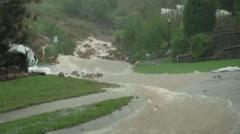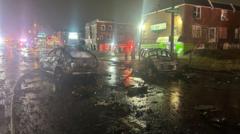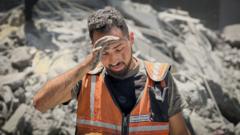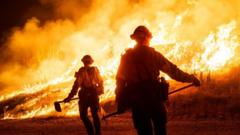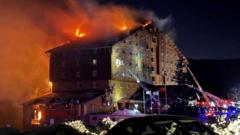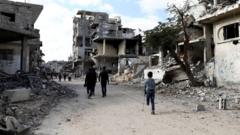Spain is sending 500 additional troops to Valencia to support overwhelmed local authorities amidst rising public discontent over their disaster response following devastating flooding that has resulted in over 200 fatalities.
Spain Mobilizes Additional Troops in Valencia Amid Criticism Over Flood Response
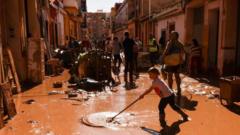
Spain Mobilizes Additional Troops in Valencia Amid Criticism Over Flood Response
Extra military personnel deployed to assist while communities grapple with severe flooding damage.
On the ground in Valencia, as communities recover from a catastrophic flooding crisis, Spain's government has dispatched an additional 500 soldiers to assist in ongoing relief efforts that have been criticized for their inadequate speed and effectiveness. The recent torrential rains that began earlier this week unleashed catastrophic floods, particularly impacting Valencia, where the death toll exceeds 200. Tragically, local authorities fear the toll may continue to rise as rescue operations struggle to reach those trapped.
Authorities are currently focused on pumping water from submerged areas, including underground tunnels and parking lots, where individuals may still be stranded. As thousands of volunteers mobilize to aid in recovery efforts, local officials have implemented traffic restrictions to prioritize emergency access throughout the region. Weather alerts remain active across northeastern and southern Spain, extending through the weekend, with similar conditions predicted for the Balearic Islands.
Public criticism is mounting as residents express frustration over the delayed response from officials prior to the flooding, with many voicing the sentiment that warnings were insufficient. Amparo Andres, a lifelong shopkeeper, recounted her terrifying experience and lamented the loss of her business, stating, "At least I'm alive, but I've lost everything," criticizing the government's assistance.
In addition, the federal government is under scrutiny for a perceived slow mobilization of military resources and declining international aid offers. Prime Minister Pedro Sanchez has committed to bolstering support resources for those impacted by the disaster while community-led volunteer initiatives have emerged, setting a remarkable example of solidarity amid destruction.
In areas hardest hit, like Paiporta, residents are demanding more assistance, as essential supplies and personnel for recovery have not arrived promptly. Many are banding together in efforts to clear debris and assist one another, heightening the urgency of a government response to aid frustrated communities.
Multiple regions in southern Spain also brace for their own flooding crises as severe weather continues. Scientific assessments have indicated that this year's rainfall could be a result of climate change, compounding the challenges faced by emergency crews and residents alike.
As community recovery efforts progress, a sense of urgency lingers amid criticism, and both local and federal authorities swiftly look for ways to address the public's outcry for better communication and disaster preparedness in the face of increasingly severe weather events.
Authorities are currently focused on pumping water from submerged areas, including underground tunnels and parking lots, where individuals may still be stranded. As thousands of volunteers mobilize to aid in recovery efforts, local officials have implemented traffic restrictions to prioritize emergency access throughout the region. Weather alerts remain active across northeastern and southern Spain, extending through the weekend, with similar conditions predicted for the Balearic Islands.
Public criticism is mounting as residents express frustration over the delayed response from officials prior to the flooding, with many voicing the sentiment that warnings were insufficient. Amparo Andres, a lifelong shopkeeper, recounted her terrifying experience and lamented the loss of her business, stating, "At least I'm alive, but I've lost everything," criticizing the government's assistance.
In addition, the federal government is under scrutiny for a perceived slow mobilization of military resources and declining international aid offers. Prime Minister Pedro Sanchez has committed to bolstering support resources for those impacted by the disaster while community-led volunteer initiatives have emerged, setting a remarkable example of solidarity amid destruction.
In areas hardest hit, like Paiporta, residents are demanding more assistance, as essential supplies and personnel for recovery have not arrived promptly. Many are banding together in efforts to clear debris and assist one another, heightening the urgency of a government response to aid frustrated communities.
Multiple regions in southern Spain also brace for their own flooding crises as severe weather continues. Scientific assessments have indicated that this year's rainfall could be a result of climate change, compounding the challenges faced by emergency crews and residents alike.
As community recovery efforts progress, a sense of urgency lingers amid criticism, and both local and federal authorities swiftly look for ways to address the public's outcry for better communication and disaster preparedness in the face of increasingly severe weather events.

